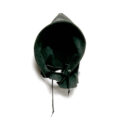For whom the trumpet sounds: on Laura Kasischke’s The Infinitesimals

“They are neither finite quantities nor quantities infinitely small, nor yet nothing. May we not call them the ghosts of departed quantities?” This epigraph from George Berkeley’s The Analyst primes the reader to expect that the book will, to some extent, work through certain key questions: about boundaries—can we demarcate the finite and the infinite? relativity—can we differentiate a small, quotidian life event from a large, tragic one? and mortality—can we, dying animals, fasten to and endure in alternative forms? The Infinitesimals addresses these abstracted interrogatives and more. It contains a repository of images and phrases that surface, retreat, and then reappear, apparitions that haunt with the disembodied realization that haunting is natural because nature repeats herself, or almost does.

The Infinitesimals
by Laura Kasischke
$16.00, Softcover
Copper Canyon Press, 2014
Kasischke acknowledges, for instance, her long line of predecessors—mostly “dead white men” like “Pound / in Pisa in a cage” and “his friend Eliot / holding a fountain pen—as if to uplift their words so that they “step / shyly off the page”—and revises established symbols from the Western canon as well, invoking Dante’s Inferno but replacing Virgil with Plath. Each of the book’s four sections are titled for a poem that’s located in a different section, and she uses the same title, “Beast of the Sea,” for four different poems, each in a separate section. Such iterative imagery and structure divides a life into its infinitesimal parts, emphasizing the multitudinous array of sensations, memories, histories, and values that are gathered together in the formation of a single identity.
To account for microscopic details like “this ant at the picnic confused inside my sandwich” and macroscopic ones like the Creator who “snapped His fingers over the water” requires an almost omniscient, transcendent perspective that Kasischke herself become infinitesimal; that she crawl “in through [another’s] / eyes, depositing, then / leaving,” as she writes in “The Two Witnesses”; that she become, as much as possible, a “witness / to everything.” The inclusion of the grand pronoun everything is significant. To become a witness one provides formal evidence that some event transpired; becoming a witness to everything, though, could mean providing evidence for what has transpired throughout all of time. At the very least, it means pressing the boundaries of linear temporality. And Kasischke does just that. An aptly titled poem, “Perspective,” describes the structure of The Infinitesimals as a collection and the structure of individual poems as well: both are akin to “the pages / of the novel / scattered by the wind: the end / at the beginning / in the middle again.” This narrative form, or lack of form, deranges and rearranges sequence, and offers Kasischke a more “polished lens” through which to witness the varied aspects of her own life.
“That Men Should Kill One Another” offers a perfect example. The poet effectively juxtaposes an organically-composed repetition (“bread that rises and continues to rise”) and a futile habit (“the recital performed every night / little girl… in an empty audience”); an historical archetype of violence (the “solider / on a horse / bearing a skull on a pole”) and a personal admission of lingering regret (“I call your name, many / years too late”). She seamlessly transitions from “one edge of the everything to the next,” and moving from border to border provides a means of access to consciousness: “The thoughts of the schoolgirl dragging / her backpack across the grass. / The thoughts of the sleep-walker, and the trashman, and / the flower tender, and the / teenage couple at the mall. / Like I have been handed them all” (“May Morning”).
The very first image in The Infinitesimals concerns a return: “A small thing crawling toward me / across this dark lawn.” This is a reunion in which the reader remains unsure of the actors. Examining the way the “small thing” moves—crawling “from / long ago, and very far”—as well as its size—“smaller this time than the stars”—suggests that it could be the “Beast of the Sea” that’s referenced in Kasischke’s recycled titles. In the third iteration, the beast is likened to “that / time-and-space-machine” and, in the fourth, to the insight that “something happened / and kept happening / but not to me.” Perhaps “the small thing” is a loved one who is now but a memory, one of “the billions who died before” and “is / at home in their tiny shining places” (Abel de Larue, 1582). Of course the identity of the “small thing” is of no great consequence; rather, the speaker’s preexisting familiarity with the “small thing” is what generates the emotional premise and dramatic action both.
The beginnings in The Infinitesimals often also represent premature conclusions. Take, for example, Kasischke’s use of apocalyptic motifs. “The First Trumpet,” which appears in the book’s first section, signifies a certain religious finality. But a boy stands in place of any celestial angel, and he produces a tune so slow it “became a single note”; parental judgment on an “exasperated” daughter with a “top cut too low” likewise supplants judgment on the soul. Lest we mistake the “He” described as “the Understanding” and “the Knower” for a Creator, Kasischke clarifies that “He” is in fact her father, standing in the driveway, as if to prevent her from attending a party. The residential backdrop for adolescence is depicted in terms of antiquated battle metaphors. To a young Kasischke, her father’s dejection reverberates as if ushering the end of her world. The potency of his dejection arises in part, too, from the internal rhymes leading to up to the poem’s final line—“No” her “top cut too low,” desire to “go,” the image of “wounded soldiers / crawling home.” Kasischke recognizes that, at this sounding of the first trumpet, her youthful self has conflated the trivial with the consequential. She is suddenly unable to discern what exactly is at stake.
In adulthood, however, she learns to expect these trumpets, and “receives silence instead” (“Second Trumpet”). The prepositional phrases used to reverse the traditional orientation to life—“after the funeral / And just before the diagnosis”—read again as if they are on “pages / of the novel / scattered by the wind.” The language, it seems, is playfully self-conscious of her instruction to narrate with “the end / at the beginning / in the middle again.” Kasischke’s third and final trumpet poem appears halfway through the volume, and though it too follows the same anti-narrative instructions, it also diverges from the previous two poems: there are no first person pronouns, there is no explicit mention of Kasischke-as-narrator. Rather, the poem advances in second-person speech, addressing the subject as if relaying information she wish she had known: “…that beautiful tune / they like to play before the execution. / They played it through the entirety of your life, but it / was background music. / You weren’t supposed to listen to it.”
Now that Kasischke is listening to the “beautiful tune,” she can make music of her own. Throughout the collection, Kasischke displays a marvelous control of language. She varies meter in accordance with content: seeing a young woman hit by a car leaves her feeling like “gushing meat” and the free verse of the passage is as abrupt as the experience, irregular and enjambed. She laments the sacrifice that accompanies maternity and futility that accompanies the corporeal through assonance—“green dress,” “amputated breast,” “soul made out of flesh”—that is forceful and demanding, unrelenting and sustained. “And that’s how my life passed… / I stood in that grass and sang, to my baby, a song…,” she recounts in the penultimate poem, “Over.” And, to be sure, Kasischke writes as if The Infinitesimals—or her life’s soundtrack, for that matter—are over. She uses the past tense throughout: “passed,” “stood,” “sang.” The poem’s title implies a final account. But the last poem, “Present Perfect,” intentionally and effectively subverts this finality, beginning with its title: present perfect describes a past event with present consequences. No time frame is necessary. The lack of framing imbues an event with a certain timelessness. “This has been / the tiny house / in which we all / have, at one time, lived / in terror, in safety,” she tells us. The final poem begins, accordingly, with verse written in the present perfect tense and ends with the transitory “[have] moved on.”
The Infinitesimals is a contained personal space: Kasischke has shared moments of terror and safety all “at one time” because, by this time, she has witnessed everything. Yet, as prescribed by her own narrative instructions, she must end in the middle—the whole must remain in flux. Under such an interpretation, the penultimate poem, “Over,” does not signal the end; it indicates passage: perhaps a river crossing, perhaps an era survived. Kasischke stands upon Whitman’s leaves. Life’s beginning, middle, and end are “not disjoined, but joined.”
About Aisha Bhoori
Aisha Bhoori is a rising sophomore at Harvard University. Her poems, short stories, and articles have appeared in Azizah, The Copperfield Review, Dog Eat Crow Magazine, Eunoia Review, Harvard Political Review, Harvard's Journal for Public Interest, TIME, and Three Line Poetry, among others.





